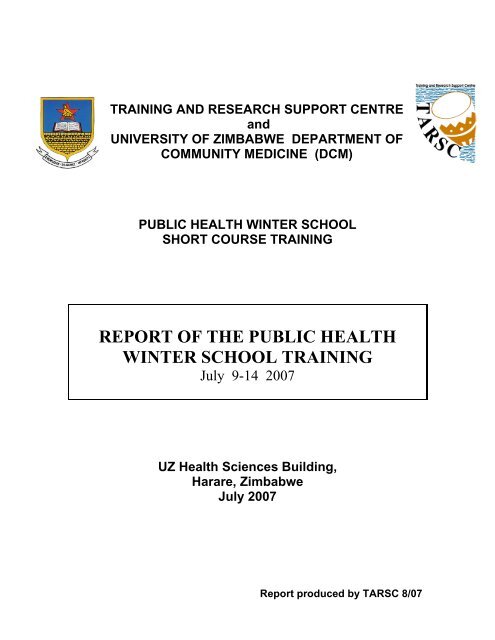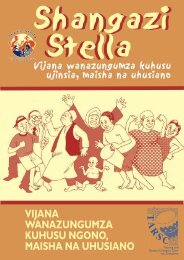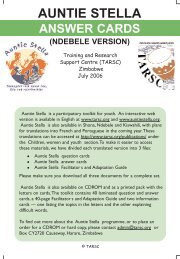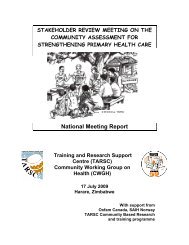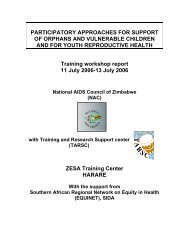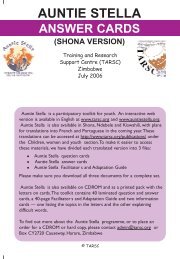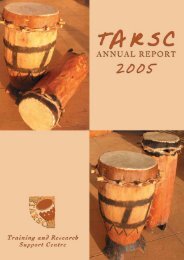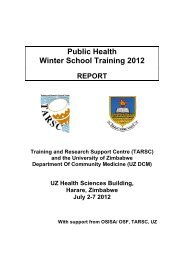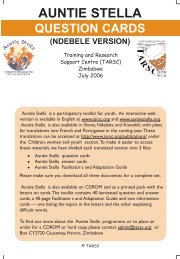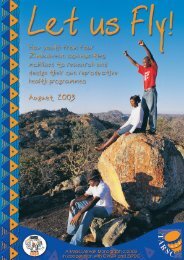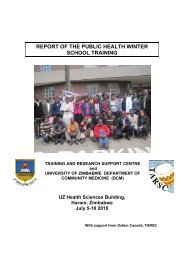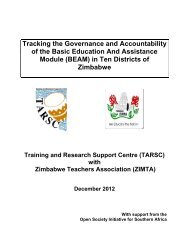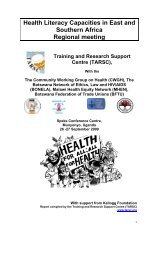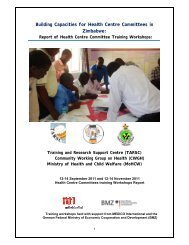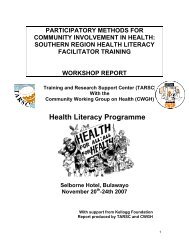WS07 REPORT.pdf - Training and Research Support Centre
WS07 REPORT.pdf - Training and Research Support Centre
WS07 REPORT.pdf - Training and Research Support Centre
Create successful ePaper yourself
Turn your PDF publications into a flip-book with our unique Google optimized e-Paper software.
TRAINING AND RESEARCH SUPPORT CENTRE<br />
<strong>and</strong><br />
UNIVERSITY OF ZIMBABWE DEPARTMENT OF<br />
COMMUNITY MEDICINE (DCM)<br />
PUBLIC HEALTH WINTER SCHOOL<br />
SHORT COURSE TRAINING<br />
<strong>REPORT</strong> OF THE PUBLIC HEALTH<br />
WINTER SCHOOL TRAINING<br />
July 9-14 2007<br />
UZ Health Sciences Building,<br />
Harare, Zimbabwe<br />
July 2007<br />
Report produced by TARSC 8/07
Table of contents<br />
Executive Summary<br />
1 Background<br />
2. The course<br />
2.1 Introduction to the course<br />
2.2 Introduction to epidemiology <strong>and</strong> public health<br />
2.3 Epidemiology of HIV <strong>and</strong> AIDS: Current situation.<br />
2.4 HIV <strong>and</strong> AIDS Prevention, treatment <strong>and</strong> care.<br />
2.5 Epidemiology <strong>and</strong> management of TB <strong>and</strong> Malaria<br />
2.6 Nutrition <strong>and</strong> food security: issues <strong>and</strong> multisectoral responses<br />
2.7 Assignment one : On Public health<br />
2.8 Zimbabwe’s health services <strong>and</strong> district health systems<br />
2.9 Primary health care policies <strong>and</strong> practice<br />
2.10 Managing <strong>and</strong> retaining health workers at district level<br />
2.11 Essential drug supplies <strong>and</strong> rational drug use<br />
2.12 Health care financing in Zimbabwe<br />
2.13 Financing of HIV <strong>and</strong> AIDS prevention, treatment <strong>and</strong> care<br />
2.14 Mechanisms for community participation in health<br />
2.15 Panel discussion: Non health sector roles in health:<br />
2.16 Assignment two: On Community diagnosis to improve health<br />
2.17 Presentation skills<br />
3. The course evaluation, text <strong>and</strong> closing sessions<br />
3.1 Test of knowledge<br />
3.2 Course evaluation<br />
3.3 Follow up <strong>and</strong> other sources of training<br />
3.4 Course certificates <strong>and</strong> closing remarks<br />
Appendix 1: <strong>Training</strong> programme<br />
Appendix 2 : Student list<br />
1
Executive Summary<br />
The University of Zimbabwe, Department of Community Medicine (UZ-DCM) together with the<br />
<strong>Training</strong> <strong>and</strong> <strong>Research</strong> <strong>Support</strong> <strong>Centre</strong> (TARSC), held for the third year the Public Health<br />
Winter School short course-training programme at UZ Health Sciences Building from the 9 th -<br />
14 th of July 2007.<br />
The structure <strong>and</strong> content of the course was based on the findings from a needs <strong>and</strong> capacity<br />
assessment carried out by the two institutions in 2005 <strong>and</strong> the feedback from the July 2005<br />
<strong>and</strong> July 2006 Winter School courses.<br />
The programme was aimed at building capacities for people working particularly at district<br />
level in health-related work, but who may not have had the benefit of formal training in health.<br />
The course included people from government, education, social welfare, from health related<br />
civil society, from researchers working at community level <strong>and</strong> parliament technical staff<br />
including reporters. The course aimed to build an underst<strong>and</strong>ing of public health <strong>and</strong> of health<br />
systems, particularly at district level. The course covered<br />
• Principles of public health <strong>and</strong> epidemiology<br />
• Major public health issues, including HIV <strong>and</strong> AIDS, TB, Malaria, nutrition<br />
• Elements of health systems, health financing, essential drug supplies <strong>and</strong> human<br />
resources for health<br />
• Zimbabwe’s health services at national, district <strong>and</strong> primary healthy care level<br />
• Community <strong>and</strong> non health sector roles in health<br />
An open invitation was made for applicants <strong>and</strong> of the pool of 50 applicants a total of 29<br />
people were accepted <strong>and</strong> 27 participants attended the course, 20 women <strong>and</strong> 7 men.<br />
Participants included district level officers from various government ministries, non<br />
governmental organisations, civil society <strong>and</strong> research organisations working on HIV <strong>and</strong><br />
AIDS programmes <strong>and</strong> reporters from the parliament of Zimbabwe. Participants came from or<br />
worked in various districts across the country. There were enquiries from foreign students<br />
some from as far as Nigeria but these could not be taken on this year as they all needed<br />
sponsorship.<br />
The resource persons <strong>and</strong> facilitators for the course came from the University of Zimbabwe,<br />
<strong>Training</strong> <strong>and</strong> <strong>Research</strong> <strong>Support</strong> <strong>Centre</strong>, Ministry of Health <strong>and</strong> Child Welfare, National AIDS<br />
Council of Zimbabwe, Food <strong>and</strong> Nutrition Council of Zimbabwe, Non governmental<br />
organisations (CWGH, WAG) Parliament of Zimbabwe <strong>and</strong> City of Harare Health Department.<br />
Sessions were accompanied by h<strong>and</strong>outs <strong>and</strong> course materials. Two assignments were done<br />
by the students in groups to test their public health <strong>and</strong> health systems knowledge. The<br />
second assignment also involved development <strong>and</strong> feedback on a community based project.<br />
This will be followed up on to support community level research skills.<br />
Students completed a course evaluation form at the end of the training to give feedback on<br />
the strengths <strong>and</strong> weaknesses of the training. The evaluation indicated that students found<br />
the course relevant to their work <strong>and</strong> the course useful. Students rated trainers <strong>and</strong> materials<br />
as good. The majority of students understood the lectures, <strong>and</strong> found the h<strong>and</strong>outs <strong>and</strong><br />
assignments clear <strong>and</strong> appreciated the Zimbabwe relevant content. For future courses<br />
students proposed the inclusion of various other topics not covered especially introduction to<br />
research methods <strong>and</strong> grant proposal writing. The course included discussion on further<br />
training opportunities for these areas. Various subjects were also suggested for the proposed<br />
follow up advanced course.<br />
An end of course test was completed with all students passing. The Dean of the School of<br />
Medicine Prof MM Chidzonga gave closing remarks <strong>and</strong> h<strong>and</strong>ed out Certificates of completion<br />
to students marking the end of the Course.<br />
2
1 Background<br />
The University of Zimbabwe, Department of Community Medicine (UZ-DCM) together with the<br />
<strong>Training</strong> <strong>and</strong> <strong>Research</strong> <strong>Support</strong> <strong>Centre</strong> (TARSC), held the third Public Health Winter School short<br />
course-training programme at UZ Health Sciences Building from the 9 th -14 th of July 2007.<br />
The programme is aimed at building capacities for people working particularly at district level in<br />
health-related work, but who may not have had the benefit of formal training in health. The course<br />
thus aims to include people from local government, from health related services <strong>and</strong> sectors<br />
working in areas related to health at district level, from civil society <strong>and</strong> from community leaders<br />
with roles in health.<br />
The course aims to build an underst<strong>and</strong>ing of public health <strong>and</strong> of health systems,<br />
particularly at district level.<br />
The course covered<br />
• Principles of public health <strong>and</strong> epidemiology<br />
• Major public health issues, including HIV <strong>and</strong> AIDS, TB, Malaria, nutrition<br />
• Elements of health systems, health financing <strong>and</strong> human resources for health<br />
• Zimbabwe’s health services at national, district <strong>and</strong> primary health care level<br />
• Community <strong>and</strong> non health sector roles in health<br />
Participants were selected from 50 applicants who responded to an open call, <strong>and</strong> a total<br />
of 27 participants attended the course, 20 women <strong>and</strong> 7 men. Participants included<br />
district level officers from various government ministries, non governmental<br />
organisations, civil <strong>and</strong> research organisations working on HIV <strong>and</strong> AIDS programmes<br />
<strong>and</strong> the committee clerk <strong>and</strong> reporters from parliament of Zimbabwe.<br />
The course involved teaching, presentations <strong>and</strong> mentored assignments. The course<br />
programme is shown in Appendix 1. Students carried out two mentored assignments during the<br />
course to consolidate their knowledge in areas of Public health, <strong>and</strong> Health systems.<br />
H<strong>and</strong>outs were provided for each session in the programme, <strong>and</strong> a list of reference materials <strong>and</strong><br />
useful websites made available for follow up reading on subject areas. An end of course test was<br />
completed <strong>and</strong> certificates of completion were given at the end of the course.<br />
The course was jointly administered by UZ DCM <strong>and</strong> TARSC. Proceedings of the one<br />
week training course are briefly outlined below. A full set of h<strong>and</strong>outs <strong>and</strong> reading<br />
materials is provided with the course. The sessions provided time for questions <strong>and</strong><br />
discussion. These discussions were very lively <strong>and</strong> gave time for delegates to raise<br />
issues arising from their work in the districts. They are not recorded here.<br />
2. The course<br />
2.1 Introduction to the course<br />
The background, course overview, objectives <strong>and</strong> participant introduction was facilitated<br />
by Professor S Rusakaniko UZ-DCM <strong>and</strong> Dr Rene Loewenson TARSC.<br />
3
An Introduction to public health<br />
2.2 Introduction to epidemiology <strong>and</strong> public health<br />
Dr Rene Loewenson TARSC, gave a general introduction to the principles of public<br />
health <strong>and</strong> key concepts in epidemiology <strong>and</strong> how they are used in public health. She<br />
defined public health, <strong>and</strong> outlined using examples from Zimbabwe the basic elements<br />
of public health, the measures <strong>and</strong> concepts in epidemiology, how the data is collected<br />
<strong>and</strong> used <strong>and</strong> how it is applied to address public health.<br />
2.3 Epidemiology of HIV <strong>and</strong> AIDS: Current situation.<br />
Dr A Mahomva (Elizabeth Glazier Pediatric HIV <strong>and</strong> AIDS Foundation ) gave an outline<br />
of the epidemic pattern of HIV <strong>and</strong> AIDS: the transmission mechanisms <strong>and</strong> natural<br />
history of AIDS <strong>and</strong> the trends globally <strong>and</strong> in Zimbabwe of the epidemic. She informed<br />
delegates of the distribution <strong>and</strong> determinants of HIV, <strong>and</strong> the current levels <strong>and</strong> trends<br />
in the HIV <strong>and</strong> AIDS epidemic through prevalence, incidence <strong>and</strong> mortality data. She<br />
used the evidence to describe patterns of vulnerability <strong>and</strong> susceptibility in HIV <strong>and</strong> AIDS<br />
<strong>and</strong> the major public health challenges this raises <strong>and</strong> the opportunities for responses.<br />
2.4 HIV <strong>and</strong> AIDS Prevention, treatment <strong>and</strong> care.<br />
Dr T R Bwakura, a Specialist physician ( Ministry of Health OI Clinic) outlined the options for<br />
prevention, treatment <strong>and</strong> care for HIV <strong>and</strong> AIDS, as well as for opportunistic infections. He also<br />
outlined the current options for Antiretroviral treatment (ART) <strong>and</strong> the issues related to<br />
managing treatment <strong>and</strong> care in Zimbabwe.<br />
2.5 Epidemiology <strong>and</strong> management of TB <strong>and</strong> Malaria<br />
Dr C Duri (Harare City Health Department) outlined the current distribution of<br />
Tuberculosis (TB) in Zimbabwe, its distribution <strong>and</strong> causes. His presentation explored<br />
that TB is, <strong>and</strong> what TB infection is, the major sources of TB infection <strong>and</strong> the<br />
progression from infection to disease. He outlined the current TB trends including the<br />
new XDR strains <strong>and</strong> how TB can be controlled <strong>and</strong> managed, making clear the roles of<br />
communities <strong>and</strong> health services.<br />
On Malaria, Dr J Chirenda UZ DCM provided information on the epidemiology of<br />
malaria, the burden of malaria, <strong>and</strong> its transmission in Africa, Zimbabwe. He discussed<br />
with delegates the burden posed by malaria on health systems, on households <strong>and</strong> local<br />
economies <strong>and</strong> how these can be prevented <strong>and</strong> dealt with. Dr J Chirenda gave a<br />
practical presentation on experiences of managing malaria.<br />
Both sessions outlined <strong>and</strong> discussed the steps to establish a community approach to<br />
TB <strong>and</strong> Malaria management with participants.<br />
2.6 Nutrition <strong>and</strong> food security: issues <strong>and</strong> multisectoral responses<br />
Mr F Makamba University of Zimbabwe department of food science gave a lecture on<br />
nutrition, defining terms <strong>and</strong> outlining the major elements of individual, household, <strong>and</strong><br />
national food needs, how these are met <strong>and</strong> the elements of malnutrition. He outlined<br />
the impact of HIV <strong>and</strong> AIDS on nutrition <strong>and</strong> the nutritional requirements for PLWHA. He<br />
presented the national policies for food security <strong>and</strong> nutrition <strong>and</strong> how the interventions<br />
on nutrition interact with wider health <strong>and</strong> social issues. There was active discussion on<br />
this issue, particularly on issues relating to community level <strong>and</strong> to nutrition issues facing<br />
people living with HIV <strong>and</strong> AIDS.<br />
4
2.7 Mentored assignment one : On Public health<br />
This exercise aimed to use the teaching on public health to test how participants will<br />
apply this knowledge. It took the example of developing an action plan for district level to<br />
use resources to address the most important health problems through approaches<br />
outside the curative health services. Students were put in 5 groups mixing the different<br />
institutions. Each group was asked to prepare an plan for a non curative intervention at<br />
district level to manage a health problem in a district. They worked in groups <strong>and</strong><br />
presented their plans in a plenary for discussion with guidance from Prof S Rusakaniko<br />
<strong>and</strong> Dr Loewenson.<br />
Participants developed assignments on the following areas<br />
Group One presented an intervention to reduce asbestosis among Zvishavane Mine<br />
Employees. The intervention presented aimed to sensitize all managers <strong>and</strong> line<br />
mangers on the effects of asbestosis <strong>and</strong> make respiratory health an organizational<br />
investment priority. The measures included those to equip them the organization with<br />
workplace safety behavior monitoring skills, training of 500 underground mine<br />
employees on Health Education <strong>and</strong> Promotion to raise awareness of asbestosis<br />
through literature <strong>and</strong> visual aides, <strong>and</strong> an evaulation to gauge the effectiveness of the<br />
intervention<br />
Group Two presented an intervention on Malnutrition in Zaka District. It aimed to identify<br />
the why there is a high prevalence of malnutrition in children under five leading to high<br />
mortality <strong>and</strong> morbidity rates. It proposed measures to enlist community <strong>and</strong> partner<br />
participation to enhance nutrition <strong>and</strong> create sustainable food resources.<br />
Group Three presented an intervention on a Diarrhea Outbreak In Epworth District. It<br />
provided measures to create awareness of the problem amongst key stakeholders,<br />
sensitization stakeholders to take social responsibility for the problem, particularly<br />
through school health masters <strong>and</strong> community health workers. It included a plan to<br />
develop safe water sources <strong>and</strong> to promote general <strong>and</strong> personal hygiene, sanitation<br />
<strong>and</strong> waste management. The intervention also included promotion of oral rehiyrdration<br />
solution <strong>and</strong> of food hygiene.<br />
Group 4’s presentation was on Rabies in Mangwe District: The group proposed<br />
measures to eliminate rabid dogs <strong>and</strong> reduce the number of people bitten by dogs in<br />
Mangwe district by 2010 by reducing contact between dogs <strong>and</strong> wildlife animals <strong>and</strong><br />
reducing rabid dogs in the district. Their actions involved fencing of homesteads,<br />
securing game reserve fences, strict enforcement of by laws on poaching <strong>and</strong> building<br />
consensus through advocacy, vaccination of dogs, educating the community on rabies<br />
<strong>and</strong> rabies surveillance.<br />
Group 5 presented an intervention to deal with a cholera outbreak in Kwekwe Amaveni<br />
suburb. They outlined the context of the area in terms of the density of living conditions,<br />
poor waste disposal, overcrowding, bursting of sewage pipes, dumpsites located near<br />
houses, erratic water supplies <strong>and</strong> vegetable <strong>and</strong> fruit markets located where there are<br />
no toilets <strong>and</strong> water toilets. Their actions included dialogue with city fathers on<br />
relocation of dumpsites. repair of burst sewer pipes, regular collection of garbage <strong>and</strong><br />
improved water supplies. They also proposed upgrading the vegetable market st<strong>and</strong>ards<br />
<strong>and</strong> carrying out public awareness campaigns.<br />
The group assignments were reviewed by the students <strong>and</strong> the facilitators <strong>and</strong> feedback<br />
given on each.<br />
5
An Introduction to health systems<br />
2.8 Zimbabwe’s health services <strong>and</strong> district health systems<br />
Mr S Chihanga, Ministry of Health & Child Welfare, talked about Zimbabwe’s health<br />
systems. He outlined the MOH&CW vision <strong>and</strong> mission, the organogram for the<br />
ministries <strong>and</strong> the health care providers in Zimbabwe. His presentation covered the<br />
relationships <strong>and</strong> operational context of the different providers, <strong>and</strong> the roles <strong>and</strong><br />
responsibilities of different levels of the health system. Finally he outlined the<br />
composition of district health executives, including the role of local govt <strong>and</strong> community<br />
level representatives.<br />
2.9 Primary health care policies <strong>and</strong> practice<br />
Mrs J Maradzika UZ-DCM introduced the concepts of Primary Health Care (PHC). She<br />
gave a background to PHC, its attributes <strong>and</strong> components <strong>and</strong> the PHC policies <strong>and</strong><br />
practices in Zimbabwe within the context of the overall National Healthy policy<br />
framework <strong>and</strong> the mission <strong>and</strong> core values of the MOHCW. She gave examples of<br />
different aspects of PHC as practiced in Zimbabwe. She presented the value of these<br />
approaches in addressing the major health problems within districts, using specific<br />
examples.<br />
2.10 Managing <strong>and</strong> retaining health workers at district level<br />
Mr A Mbengwa Zimbabwe Association of Church Hospitals outlined the human<br />
resources policy in the public sector, the challenges faced in relation to health worker<br />
migration, retention, production <strong>and</strong> distribution <strong>and</strong> the strategies used for retention of<br />
staff, including those relating to incentives <strong>and</strong> conditions of service. He outlined other<br />
strategies used by Ministry of Health to deal with health worker losses <strong>and</strong> provide for<br />
health system needs. He commended the establishment of the Primary Care Nurses<br />
through the PCN training programme <strong>and</strong> noted that this had alleviated the staffing<br />
problems at rural health centres.<br />
2.11 Essential drug supplies <strong>and</strong> rational drug use<br />
Ms Simoyi National Pharmaceutical Services gave a lecture on the national essential drugs<br />
programme. She defined essential drugs <strong>and</strong> outlined the advantages of an essential drugs<br />
programme in a country like Zimbabwe, the components of the programme <strong>and</strong> the<br />
elements of drug management, including community roles in rational drug use.<br />
2.13 Health care financing in Zimbabwe<br />
Mr Shepherd Shamu ZEPARU, gave a presentation on health care financing in<br />
Zimbabwe. He described how funds are raised for health across different sources, the<br />
levels of financing <strong>and</strong> how funds are distributed to different providers <strong>and</strong> consumers in<br />
Zimbabwe. He explained how national health accounts are carried out in Zimbabwe <strong>and</strong><br />
what their results show. He discussed the major resource allocation approaches for<br />
health <strong>and</strong> their equity, adequacy, effectiveness <strong>and</strong> efficiency. Mr Shamu outlined how<br />
the current situation relates to national policy goals.<br />
2.12 Financing of HIV <strong>and</strong> AIDS prevention, treatment <strong>and</strong> care<br />
Dr T Magure Executive Director National AIDS Council, in this paper presented on his<br />
behalf by Mr S Chirenje talked about dem<strong>and</strong> for HIV <strong>and</strong> AIDS resources in Zimbabwe,<br />
the global <strong>and</strong> national resourcing of this dem<strong>and</strong> <strong>and</strong> the current sources of funds for<br />
HIV <strong>and</strong> AIDS. This included the Global Fund <strong>and</strong> the National AIDS Trust Fund. He<br />
outlined the level of resources mobilised, the areas these resources are spent on, how<br />
funds are allocated <strong>and</strong> the mechanisms used for this at district <strong>and</strong> community level <strong>and</strong><br />
6
how these should function. He discussed the issues <strong>and</strong> challenges in resourcing the<br />
response to HIV <strong>and</strong> AIDS <strong>and</strong> how these are being met.<br />
2.13 Mechanisms for community participation in health<br />
Ms Linda Mashingaidze <strong>and</strong> Mr Itai Rusike Community Working Group on Health<br />
(CWGH), presented the concepts <strong>and</strong> levels of organization of community <strong>and</strong> of<br />
participation in health, the mechanisms for community participation in PHC <strong>and</strong> district<br />
health systems, including for co-operation within wider intersectoral action for health <strong>and</strong><br />
the issues, <strong>and</strong> challenges faced in implementing such participation. She talked about<br />
the role of civil society, of individuals <strong>and</strong> of households <strong>and</strong> the mechanisms for cooperation<br />
with health service providers <strong>and</strong> within wider intersectoral action for health.<br />
2.14 Panel discussion: Non health sector roles in health:<br />
The panel discussion session was chaired by Dr J Chirenda UZ-DCM <strong>and</strong> papers were<br />
presented <strong>and</strong> discussed by Ms A Mukono, Clerk of the Parliamentary Committee on<br />
Health, Parliament of Zimbabwe on the role of parliament <strong>and</strong> Mrs E Masiiwa, Women’s<br />
Action Group on the role of womens organisations. Their presentations outlined the roles<br />
in intersectoral action for health, how they are linked to the health sector <strong>and</strong> health<br />
services <strong>and</strong> to district level health interventions.<br />
Across all the above sessions students raised questions to presenters <strong>and</strong> issues for<br />
discussion <strong>and</strong> some sessions had very active discussions on issues raised.<br />
2.15 Assignment two: On Community diagnosis to improve health<br />
This exercise aimed to support a local community based exercise that applies the knowledge<br />
learned in the winter school. It used the knowledge learned in the sessions on public health <strong>and</strong><br />
health systems to design a community based research exercise to<br />
• Make a community level diagnosis of a common health problem in the district <strong>and</strong> propose<br />
ways of acting on it, or<br />
• Assess the effectiveness of a health service or intervention in the district <strong>and</strong> propose ways<br />
of improving it, or<br />
• Identify the barriers that specific groups in the community have to access health care <strong>and</strong><br />
identify ways of addressing these.<br />
It aimed to use the information shared in the course to apply to a local context. Students<br />
were asked to work in groups or as individuals. Participants chose to work in groups in<br />
the organizations they had come from with some cross fertilization across groups, as<br />
they wanted to be able to continue after the school to implement the work. The groups<br />
were mentored on their aims <strong>and</strong> methods <strong>and</strong> presented on programmes they designed<br />
for their selected rural <strong>and</strong> urban districts.<br />
The projects identified included the following<br />
The delegates from NAC proposed to assess the challenges preventing children (0-5) in<br />
Marondera Urban from accessing ART <strong>and</strong> within six months come up with<br />
recommendations to resolve the problem. Specifically they presented a programme to<br />
- establish the proportion of children (0-5) attending growths monitoring clinics out<br />
of the total children (0-5) within the catchments area<br />
- establish the number of children in need of ART <strong>and</strong> the proportion of the<br />
children showing clinical signs of HIV referred for treatment<br />
- identify the household factors demographical knowledge <strong>and</strong> social economic<br />
factors affecting use of growth monitoring services assessing uptake of children’s<br />
ART<br />
- increase accessibility to ART services amongst children (0-5).<br />
7
Through this they hoped to improve the quality of life of HIV positive children (0-5) <strong>and</strong> to<br />
reduce infant deaths/illnesses due to AIDS in the area.<br />
A Group working on workplace issues outlined a programme to assess the effectiveness<br />
of condom distribution <strong>and</strong> information dissemination in the prevention of HIV/AIDS in<br />
the workplace at phosphate industrial companies in Harare. They aimed to<br />
- assess the adequacy <strong>and</strong> appropriateness of current interventions ie assessing<br />
whether workers are able to access other preventive services that is VCT, STI<br />
treatment<br />
- find out the attitude of workers on condom distribution <strong>and</strong> use<br />
- determine the knowledge of workers on the mode of transmission, treatment <strong>and</strong><br />
care, prevention of HIV<br />
- make recommendations to improve the HIV/AIDS programmes<br />
- find out other available preventive interventions like STI treatment <strong>and</strong> VCT , <strong>and</strong><br />
- identify barriers against the current HIV/AIDS prevention intervention<br />
The delegates from CWGH explored the reasons for diarrhea in Chikwaka area<br />
(Goromonzi) . Their programme sought to find out the hygiene practices of children<br />
under the ages of 3-16 years old in Chikwaka area in Goromonzi district, particularly<br />
their h<strong>and</strong> washing practices before eating food <strong>and</strong> after visiting the toilet. The<br />
programme sought to find out the environmental factors affecting this, including the<br />
hygiene enabling facilities in the children’s houses <strong>and</strong> school environment <strong>and</strong> the<br />
safety <strong>and</strong> quality of water supplies as well as the children’s knowledge <strong>and</strong> attitudes<br />
towards food hygiene, h<strong>and</strong> washing, use of safe water <strong>and</strong> sanitation.<br />
The group of students from UZ-UCSF aimed to identify the barriers that men <strong>and</strong> women<br />
aged 24 to 45 years living with HIV <strong>and</strong> AIDS have in accessing Anti-Retroviral Therapy<br />
(ART) in Chitungwiza District <strong>and</strong> to explore how to overcome these barriers.<br />
They presented work to find out the social, cultural, political, <strong>and</strong> economic factors<br />
hindering the accessibility of ART to men <strong>and</strong> women aged between 20 – 45 years <strong>and</strong><br />
to find out if there are any myths <strong>and</strong> misconceptions associated with ART.<br />
The discussions on the assignments reviewed the presentations through group <strong>and</strong><br />
facilitator feedback from Dr Loewenson. Follow up steps were agreed on to further<br />
develop <strong>and</strong> submit proposals for delegates to be included in follow up research training<br />
<strong>and</strong> mentoring for their projects. Delegates were asked to submit a concept note with<br />
information on the<br />
- Title<br />
- Names, institution <strong>and</strong> addresses<br />
- The problem statement <strong>and</strong> justification<br />
- The general <strong>and</strong> specific objectives<br />
- The methods, including how authorities / ethical permission will be obtained for<br />
the work<br />
- The resources needed.<br />
Projects included would be mentored as part of follow up field training to further develop<br />
skills <strong>and</strong> linked to research, ethics, <strong>and</strong> reporting training from UZ DCM <strong>and</strong> TARSC.<br />
2.16 Presentation skills<br />
Ms Barbra Kaim TARSC, facilitated on presentation skills <strong>and</strong> key points for preparing<br />
<strong>and</strong> delivering presentations <strong>and</strong> for using visual aids. Participants responded positively<br />
to the session <strong>and</strong> requested that in the next course it be scheduled before students give<br />
their assignment presentations.<br />
8
3. The course evaluation, text <strong>and</strong> closing sessions<br />
3.3 Test of knowledge<br />
Participants completed a test designed to assess the levels of knowledge gained on<br />
content raised in the lecture sessions. The test also aimed to assess the extent to which<br />
materials were understood by students. All students passed the test, the majority<br />
performing well.<br />
3.2 Course evaluation<br />
Participants completed a course evaluation form at the end of training. A total of 22 of<br />
the 27 participants completed the evaluation forms. This was designed to collect<br />
feedback on the strengths <strong>and</strong> weaknesses of the training programme for future<br />
planning.<br />
All of those completing the evaluation,<br />
- All (100% ) found the course relevant to their work<br />
- Three quarters (77%) noted that the course is very useful<br />
- About two thirds (68%) reported that the trainers were good <strong>and</strong><br />
- Over half (55%) rated the course materials as good <strong>and</strong> a further 41% reported<br />
that the materials were very good. Delegates were keen that materials be<br />
updated yearly in each course.<br />
Generally lectures were understood, with some gaps in underst<strong>and</strong>ing (See Table 1).<br />
Some sessions were less well understood than others. Sessions that were less well<br />
understood included<br />
- Nutrition <strong>and</strong> food security<br />
- Zimbabwe’s health services<br />
- Human resources for health<br />
- Health care financing<br />
- Financing of HIV <strong>and</strong> AIDS<br />
In the discussion that was held with the participants it was noted that more time was<br />
needed for some sessions.<br />
On average sessions were rated as relevant <strong>and</strong> useful <strong>and</strong> h<strong>and</strong> outs as clear <strong>and</strong><br />
useful (See Tables 2 <strong>and</strong> 3). Sessions rated as most useful were<br />
- Introduction to epidemiology<br />
- Epidemiology of AIDS<br />
- Management of AIDS<br />
- Epidemiology of TB <strong>and</strong> malaria<br />
Improvements were called for in the h<strong>and</strong>out on Nutrition <strong>and</strong> food security for the future<br />
course.<br />
9
Table 1: Distribution of responses on underst<strong>and</strong>ing of sessions<br />
% Students response on underst<strong>and</strong>ing of<br />
Area of training<br />
sessions<br />
Understood Did not<br />
Understood all most of it underst<strong>and</strong><br />
Introduction to epidemiology 68 32 0<br />
Epidemiology of AIDS 68 32 0<br />
Management of AIDS 68 32 0<br />
Epidemiology of TB <strong>and</strong> malaria 50 41 9<br />
Management of TB <strong>and</strong> malaria at district level 50 50 0<br />
Nutrition <strong>and</strong> food security 24 41 35<br />
Zimbabwes health services 41 50 9<br />
Primary health care & district health 50 50 0<br />
Managing, retaining <strong>and</strong> organizing human<br />
0<br />
resources for health at district level (*) 23 50<br />
Essential drug supplies (*) 50 50 0<br />
Health care financing (*) 18 77 0<br />
Financing of HIV <strong>and</strong> AIDS 32 59 9<br />
Community participation 50 50 0<br />
Panel on non health sector roles on health 50 50 0<br />
(*) Non-response make up the balance<br />
Table 2: Responses on relevance <strong>and</strong> usefulness of course sessions<br />
% Students response on relevance<br />
Area of training<br />
<strong>and</strong> usefulness of session<br />
Relevant<br />
<strong>and</strong> useful<br />
Somewhat<br />
useful<br />
Not useful or<br />
relevant<br />
Introduction to epidemiology 86 14 0<br />
Epidemiology of AIDS 95 5 0<br />
Management of AIDS 95 5 0<br />
Epidemiology of TB <strong>and</strong> malaria 82 18 0<br />
Management of TB <strong>and</strong> malaria at district level 64 36 0<br />
Nutrition <strong>and</strong> food security 45 50 5<br />
Zimbabwes health services 55 45 0<br />
Primary health care & district health 68 32 0<br />
Human resources for health 50 50 0<br />
Essential drug supplies 77 23 0<br />
Health care financing 77 23 0<br />
Financing of HIV <strong>and</strong> AIDS 68 32 0<br />
Community participation 77 23 0<br />
Panel on non health sector roles on health 50 45 5<br />
10
Table 3: Responses on clarity <strong>and</strong> usefulness of h<strong>and</strong>outs<br />
Area of training<br />
% Students response on clarity <strong>and</strong><br />
usefulness of h<strong>and</strong>outs.<br />
Clear <strong>and</strong> Partly clear<br />
useful <strong>and</strong> useful<br />
Not at all clear<br />
<strong>and</strong> useful<br />
Introduction to epidemiology 91 9 0<br />
Epidemiology of AIDS 95 5 4<br />
Management of AIDS 86 14 4<br />
Epidemiology of TB <strong>and</strong> malaria 73 27 0<br />
Management of TB <strong>and</strong> malaria at district level 59 41 4<br />
Nutrition <strong>and</strong> food security 27 73 0<br />
Zimbabwes health services 55 45 0<br />
Primary health care & district health 77 23 0<br />
Human resources for health 68 32 0<br />
Essential drug supplies 86 14 0<br />
Health care financing 59 41 0<br />
Financing of HIV <strong>and</strong> AIDS 64 36 0<br />
Community participation 73 27 0<br />
Panel on non health sector roles on health 59 41 0<br />
Assignments were also generally rated as clear <strong>and</strong> useful, with 82% rating assignment<br />
one on public health in this way <strong>and</strong> a similar 82% giving this rating to assignment two<br />
on community diagnosis.<br />
3.3 Follow up <strong>and</strong> other sources of training<br />
Prof S Rusakaniko <strong>and</strong> Dr Loewenson facilitated a discussion on priorities not covered in<br />
the course <strong>and</strong> further training. Participants suggested that they were keen to get<br />
training in the following areas.<br />
o Laboratory services in public health<br />
o Reproductive health issues, youth rights <strong>and</strong> involvement in public health.<br />
o Introduction to research methods<br />
o Counselling as a contributor to health<br />
o Water <strong>and</strong> sanitation<br />
o Project planning, management <strong>and</strong> monitoring <strong>and</strong> evaluation<br />
o Disease surveillance<br />
o Role of media in public health <strong>and</strong> reporting on public health issues<br />
o Herbal medicines <strong>and</strong> public health<br />
In relation to further training almost all participants indicated an interest in doing a follow<br />
up course. It was agreed that interested students will work on their assignment two<br />
projects <strong>and</strong> develop them further as part of the training, that would also involve two<br />
rounds of research training including field work, report writing <strong>and</strong> reporting back.<br />
3.4 Course certificates <strong>and</strong> closing remarks<br />
It was a moment of jubilation as the Dean of the School of Medicine of the University of<br />
Zimbabwe Prof MM Chidzonga gave the closing remarks <strong>and</strong> h<strong>and</strong>ed over certificates<br />
of completion of the course to the participants. He commended the progamme <strong>and</strong> the<br />
inclusion of participants from diverse backgrounds ranging from rural communities to<br />
national institutions like the parliament of Zimbabwe. Thanks were given to the resource<br />
people, to the course coordinator Mr Thomas Chikumbirike, Course conveners Prof S<br />
Rusakaniko <strong>and</strong> Dr R Loewenson <strong>and</strong> the UZ-DCM <strong>and</strong> TARSC staff for their untiring<br />
efforts <strong>and</strong> collaboration in making the course a success.<br />
11
Appendix 1: <strong>Training</strong> programme<br />
1.1<br />
0800-0900 hrs<br />
1.2<br />
0900-1015 hrs<br />
COURSE TITLE<br />
INTRODUCTION<br />
1015-1045 hrs Tea Break<br />
Registration <strong>and</strong> administration<br />
Monday July 9<br />
• Course overview, objectives, delegate<br />
introduction <strong>and</strong> background<br />
• Outline of course programme,<br />
assignments, practical arrangements<br />
INTRODUCTION TO PUBLIC HEALTH<br />
1.3 1045-1230 Introduction to epidemiology <strong>and</strong> public<br />
health<br />
1230-1330 hrs Lunch<br />
1.4<br />
1330-1500 hrs<br />
1500-1515 hrs Tea break<br />
1.5<br />
1530-1700 hrs<br />
Epidemiology of HIV <strong>and</strong> AIDS: Current<br />
situation.<br />
Prevention <strong>and</strong> treatment of HIV <strong>and</strong><br />
AIDS<br />
FACILITATOR<br />
Thomas Chikumbirike, Zvikie<br />
Mlambo TARSC<br />
Dr R Loewenson, TARSC<br />
Prof Rusakaniko, UZ DCM<br />
Dr R Loewenson TARSC/EQUINET<br />
Dr A Mahomva -Elizabeth Glazier<br />
Pediatric HIV <strong>and</strong> AIDS Foundation<br />
Dr Bwakura -MOHCW OI Clinic ,<br />
Harare Hospital<br />
1.6<br />
0830-0945 hrs<br />
1.7<br />
0945-1100 hrs<br />
1100-1115 hrs Tea Break<br />
1.8<br />
1115-1245 hrs<br />
1245-1400 hrs Lunch<br />
1.9<br />
1400-1700 hrs<br />
Tuesday July 10<br />
Epidemiology <strong>and</strong> management of TB<br />
at district <strong>and</strong> community level<br />
Epidemiology <strong>and</strong> management of<br />
malaria at district <strong>and</strong> community level<br />
Nutrition <strong>and</strong> food security: issues <strong>and</strong><br />
multisectoral responses<br />
Assignment 1 Introduction <strong>and</strong> student<br />
group work time<br />
Dr C Duri –City Health Dept ,infectious<br />
diseases hospital<br />
Dr J Chirenda - UZ DCM<br />
Mr F Makamba, Food <strong>and</strong> Nutrition<br />
University of Zimbabwe<br />
Prof Rusakaniko UZ DCM,<br />
R Loewenson TARSC<br />
12
1.13<br />
0830-1000 hrs<br />
1000-1015 hrs Tea Break<br />
Thursday July 12<br />
Managing, retaining <strong>and</strong> organising human<br />
resources for health at district level<br />
Mr A Mbengwa ZACH:<br />
1.14 1015-1115 Essential drug supplies <strong>and</strong> rational drug use Ms T Simoyi – NPS Ministry of Health<br />
1.15<br />
1115-1300 hrs<br />
1300-1400 hrs Lunch<br />
Health care financing: resource mobilization,<br />
budgeting <strong>and</strong> resource allocation at district level<br />
Shepherd Shamu ZEPARU<br />
1.16 1400-1500 Financing of HIV <strong>and</strong> AIDS Dr Magure NAC<br />
1500-1515 hrs Tea break<br />
1.17 1515-1700 Mechanisms for community participation in health L Mashingaidze, I Rusike CWGH:<br />
Friday July 13<br />
0830-1000 hrs Review of Case study work/ mentored assignment Dr R Loewenson, TARSC<br />
1000-1030 hrs Tea break <strong>and</strong> admin/ resource files<br />
1.18<br />
Panel discussion: Non health sector roles in<br />
health:<br />
1030-1300 hrs<br />
Parliament,<br />
Women’s affairs<br />
1300-1400 hrs Lunch<br />
Chair :Dr J Chirenda –UZ DCM<br />
Ms A Mukono- Parliament of Zim:<br />
Ms E Masiiwa- WAG:<br />
1.19 1400-1445 Test of knowledge T Chikumbirike , TARSC<br />
1445-1500 hrs Tea break<br />
1.20 1500-1615 Presentation skills: B Kaim, TARSC<br />
CONCLUDING SESSIONS<br />
Saturday July 14<br />
1.21 0830-1000 Course evaluation <strong>and</strong> discussion, Follow up Dr R Loewenson , TARSC<br />
1000-1015 hrs Tea Break<br />
1.22<br />
1015-1130 hrs<br />
1.23<br />
1130-1230hrs<br />
1230 hrs Closing<br />
Wednesday July 11<br />
0830-1000 hrs Report back <strong>and</strong> discussion<br />
Case study work/ mentored assignment<br />
1000-1015 hrs Tea break<br />
DISTRICT HEALTH SYSTEMS<br />
1.10<br />
1015- 1145 hrs<br />
Organization of Zimbabwe’s health services<br />
<strong>and</strong> district health systems<br />
Priorities not covered in the course: further training<br />
needs <strong>and</strong> information sources<br />
Course certificates <strong>and</strong> closing remarks<br />
Prof S Rusakaniko UZ DCM<br />
Mr S Chihanga MOHCW<br />
1.11 1145-1300 Primary health care policies <strong>and</strong> practice Ms J Maradzikwa– UZ DCM:<br />
1300-1400 hrs Lunch<br />
1.12 1400-1700 Assignment 2 Introduction, group work Dr R Loewenson TARSC<br />
1500-1515 hrs Tea break<br />
Prof Rusakaniko UZ DCM<br />
Prof MM Chidzonga<br />
Dean Faculty of Medicine<br />
13
Appendix 2 : Student list<br />
# Name, institution, position in institution, address email address<br />
1 Precious Moyo Study Coordinator UZ-UCSF 15 Philips Avenue<br />
precious@uz-ucsf.co.zw<br />
Belgravia Harare Tel: 704890/ 0912259659<br />
2 Tsungai Matiure Programme Coordinator Health <strong>and</strong> Social Services Unit tsungaimatiure@yahoo.co.uk<br />
Methodist Church in Zimbabwe Box CY 71 Causeway Harare Tel: 04-724069/<br />
721154<br />
3 Sherla Greenl<strong>and</strong> Project Manager ZICHIRE Project 28 Van Praagh Ave sherla@zichire.com<br />
Milton Park Tel: 04- 725166/ 747173<br />
4 .Tamsin Steenbok Project Coordinator ZICHIRE Project<br />
tasmin@zichire.com<br />
28 Van Praagh Ave Milton Park Tel: 04- 725166<br />
5 Marshal Mujoma <strong>Research</strong> Counselor UZ-UCSF 15 Philips Avenue Belgravia munjoma@zol.co.zw<br />
Harare Tel: 704890 Fax: 704897<br />
6 Trace Chipinda Assistant Coordinator UZ-UCSF 15 Philips Avenue Belgravia trace@uz-ucsf.co.zw<br />
Harare Tel: 704890/ 0912646123 Fax: 704897<br />
7 Irene Zuya Nurse Counselor UZ-UCSF 15 Philips Avenue Belgravia Harare irynzee@yahoo.com<br />
Tel: 704890 Fax: 704897<br />
8 Patricia Dhlakama Clinic Manager UZ-UCSF 15 Philips Avenue Belgravia patricia@uz-ucsf.co.zw<br />
Harare Tel: 704890/ 0912285034 Fax: 704897<br />
9 . Lillian Chigada Outreach Worker UZ-UCSF 15 Philips Avenue<br />
chigadal@yahoo.com<br />
Belgravia Harare Tel: 704890/ 0912646128 Fax: 704897<br />
10 Grecenia Ndlovu Clinic Manager UZ-UCSF 15 Philips Avenue<br />
grecenia@uz-ucsf.co.zw<br />
Belgravia Harare Tel: 704890/ 0912283635 Fax: 704897<br />
11 Tariro Mavi CWGH 114 McChlery Avenue, Eastlea, Harare Ph -04—788100/ Tpmavi2000@yahoo.co.uk<br />
12 Edger Mutasa CWGH 114 McChlrey Avenue, Eastlea, Harare Ph -04—788100/<br />
0912313762<br />
13 C M Mukamuri Teacher CWGH 114 McChlrey Avenue, Eastlea, Harare Ph – muchamukamuri@cooltoad.co<br />
055-22770/0912280146<br />
14 Senele Dlomo Programme Officer TARSC 47 Van Praagh Ave, Milton Park senele@tarsc.org<br />
Harare Tel: 04-708835<br />
15 Fortunate Machingura Programme Officer 47 Van Praagh Ave Milton Park fortunate@tarsc.org<br />
Harare Tel: 04-708835<br />
16 Chenai Bridget Chikosha Hansard Reporter Parliament of Zimbabwe Box CY bridget_chikosha@yahoo.com<br />
298 Causeway Harare Tel: 04-700181-9 / 0912612048<br />
17 Lucia Nyawo Committee Clerk Parliament of Zimbabwe Box CY 298 Causeway lucynyawo@yahoo.com<br />
Harare Tel: 04-700181-9 / 0912892769<br />
18 Jessie Kunaka ZPP 13 Barmoral Flat Arcadia Harare Ph: 023817801<br />
19 S Marima CWGH 114 McChlrey Avenue, Eastlea, Harare Ph -04—788100/<br />
0912363824<br />
20 Moses Nyamasoka Programme Officer National AIDS Council Box CY1474 mosesnyamaz@yahoo.co.uk<br />
Causeway Harare Tel: 011513327 Fax: 04791243/ 011513327<br />
21 Sukai Govo Monitoring <strong>and</strong> Evaluation Officer National AIDS Council sgovoh@yahoo.co.uk<br />
Box CY1474 Causeway Harare Tel: 04-708043/ 011868331<br />
22 Agrippa T A Zizhou Programme Office National AIDS Council Box 1286<br />
Marondera Tel: 079-22008/ 0912936452<br />
23 Tambudzayi Godfrey Musabayana National AIDS Council Mashonal<strong>and</strong> West<br />
province P Box 609 CHINHOYI Tele: 067 22741/3/ 0912393446<br />
24 Pascal Masocha Programmes Officer National AIDS Council Box 1507<br />
Masvingo 039-263924 /011443957<br />
25 Sibusisive Marunda National Orphan <strong>and</strong> Vulnerable Children Coordinator<br />
National Aids Council No. 5 Dundry Close Strathaven Harare Tel: 0912947633/<br />
791172<br />
26 Dorothy Ndudzo Zimbabwe Chemical Plastic & Allied Workers Union<br />
Health & Safety Officer Box 4810 , Tel: 04-753103 Harare<br />
27 Francisca Binza Programme Assistant ZAN 154 Samora Machel Ave Harare<br />
Tel: 700832/ 795337/ 0912978103<br />
gtmusabayana@yahoo.com<br />
sochworks@yahoo.co.uk<br />
smarunda@nac.org.zw<br />
NA<br />
fbinza@zan.co.zw /<br />
fbinza2002@yahoo.com<br />
14


